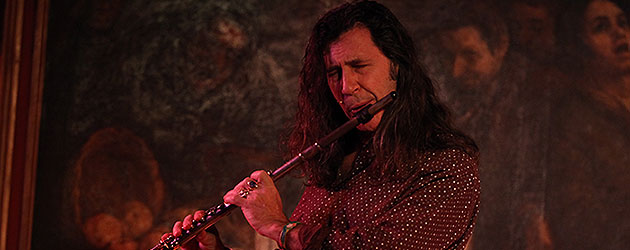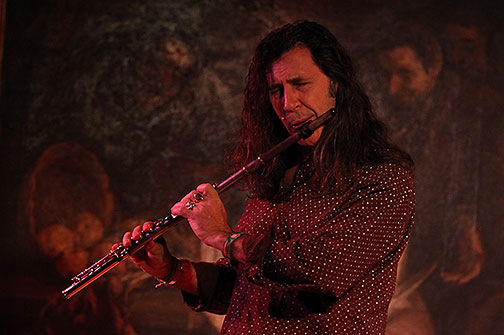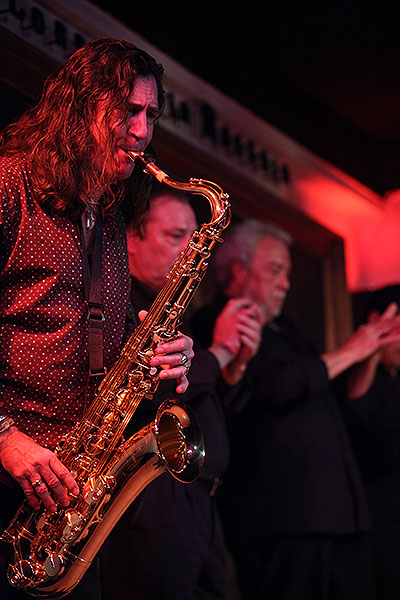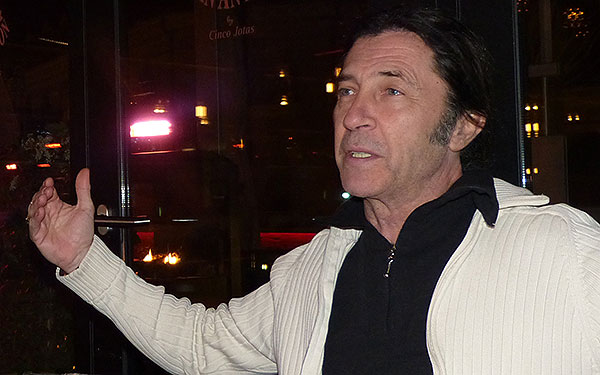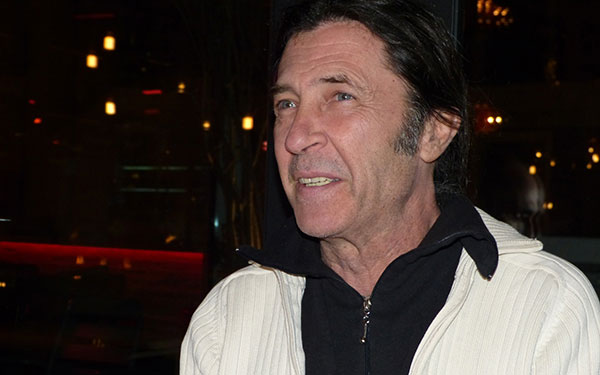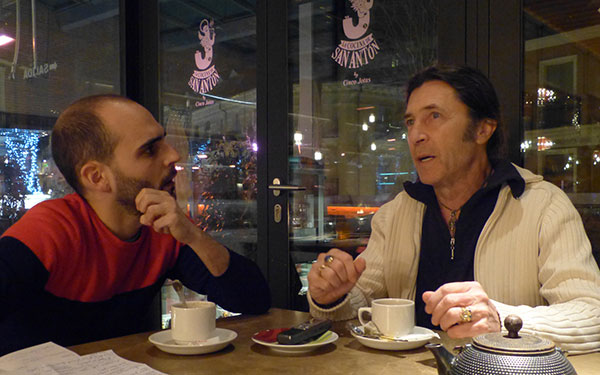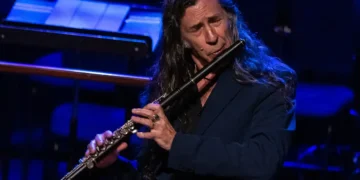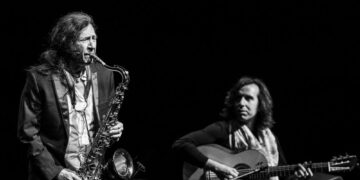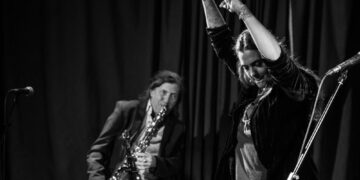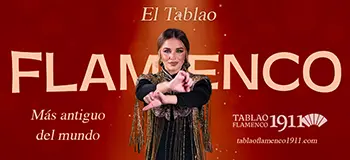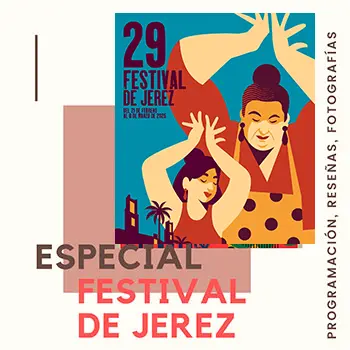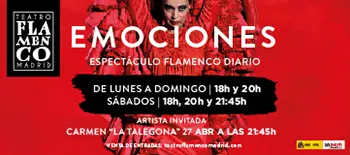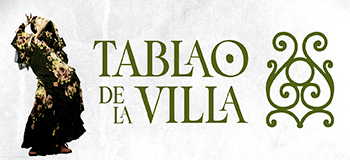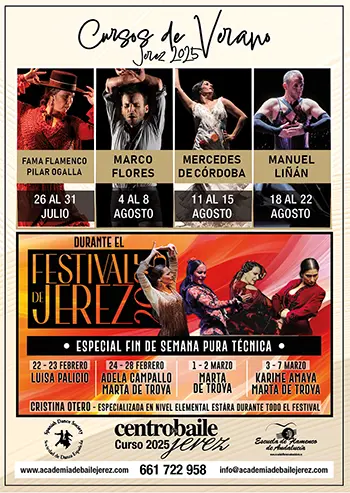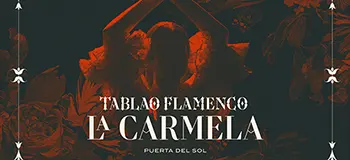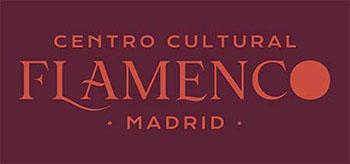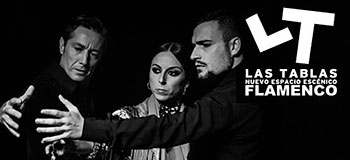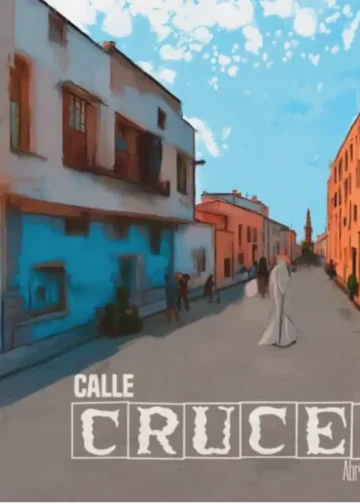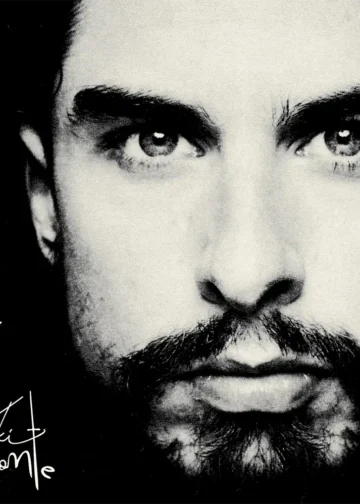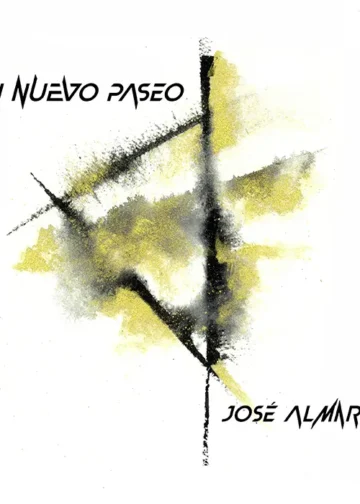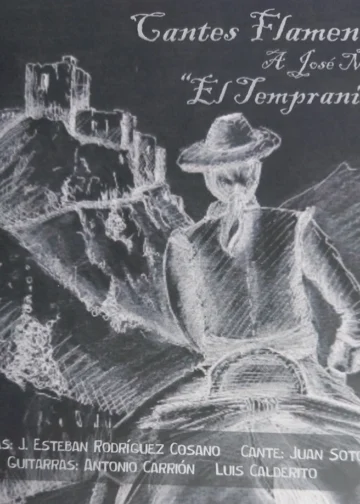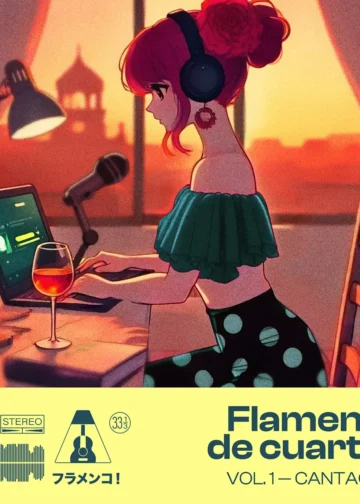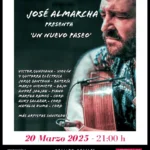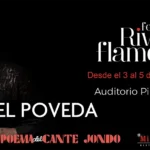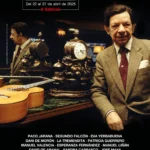Interview: Pablo San Nicasio
Live photos: Rafael Manjavacas
Interview photos: Rubén Rivas
«I'm a musician in the middle of stylistic controversy»
We knew it all along, but just in case, the Institute of French Jazz reminded us two months ago that this Madrid man is a living legend of music. And in fact he’s been working with flamenco artists for decades. The thing is, when we see Jorge Pardo in collaboration with this one and that one, when he shows up involved in concerts or when we’re lucky enough to hear him put his wind instruments to work at spontaneous gatherings, we start to take him for granted. We overlooked him. He seemed so normal. It’s unforgivable.

In this chat we had in downtown Madrid he was gracious, straightforward and cordial. With all he’s lived and experienced, he was as natural as could be. Life seen through the eyes of someone from Madrid who nevertheless feels forgotten by the good ol’ boy programming network and bureaucracy of his beloved hometown.
Congratulations Jorge. We’re surely not the first, nor will we be the last to say it.
Thank you. It’s true, people have been overwhelmingly supportive and affectionate. I’m still taking some calls and giving interviews. And so it goes, a year from now I’ll be struggling to promote my records again. But I’m the same musician as always.
You seem surprised by it all.
The award was a surprise, a big one. I’m not the kind of musician who has a powerful record company behind me, or an aggressive manager. And I don’t really have an important presence in France.
So there was no actual candidacy for this…
No. I just received notification that I’d been awarded the prize and that was it, a complete surprise. And it looks like this particular institution isn’t affected by politics or knowing the right people. They’ve proven to be quite independent, because to tell the truth, I’d never heard of them and I’ve never worked much in France beyond the two or three festivals I might do there in a given year.
And you’re just the one who sort of rejected the establishment, now they come and give you a prize.
Yeah, there are actually anecdotes about this I could tell you. But I’m happy with everyone’s reaction, yours, the specialized press that is, and now the public at large too. You know, I’d never paid attention to any of this, but there’s something special about a Spaniard being named in Paris, London or New York, it seems more important. Again I say, this is a real trip because mainstream media never paid attention to me before.
“You know, I’d never paid attention to any of this, but there’s something special about a Spaniard being named in Paris, London or New York, it seems more important. Again I say, this is a real trip because mainstream media never paid attention to me before”.
But if you become a football-player and the magazine “France Football” gives you their Balón de Oro prize, it would be even bigger news, believe me. Although this is the jazz equivalent.
Well, that’s a bit over the top…this business doesn’t move a lot of money, there’s no comparison.
What if you’d been French and they gave it to you in France?
I actually don’t know, but like I say, this time around I felt like I was in the spotlight. And let me tell you something I didn’t mention before. Beyond the media hype, a lot of friends and followers of mine received the news with even greater excitement than I did, because they identified with me after all these years of support. Now they’re proud to say “I always knew you were good”.
And what about official reaction?
Yeah…the big nothing. Not even in my own hometown…nothing. They’ve got me sidelined in Madrid. In general I have work, fortunately I can’t complain about that, but when it comes to programming I think the people in charge lack criteria.
A kind of mafia perhaps?
Well, you have to bet on what’s commercially viable, now more than ever. TV, hundreds of journalists… But a musician who does music just like that, who isn’t following in anyone’s footsteps and has no political alliances, someone who doesn’t go to the programmer’s office to kiss his feet…that person isn’t interesting or marketable.
I’m going to ask you something you might not like. Do you think the judges from the Academia del Jazz gave more importance to the flamenco aspect than to jazz itself?
I don’t mind that, quite the contrary, I love it. I’m a musician in the middle of stylistic controversy. In the sense that my duality, which doesn’t present any conflict for me, but makes problems for record stores and programmers, let’s say it becomes something that for a traditional follower of the art-form is a kind of extra added attraction, as it was for this academy of French jazz. In my case, it’s not orthodox jazz, and furthermore, I don’t consider myself a jazz musician, I haven’t got that label. In fact I’m much closer to the world of flamenco. And the result of all that can be interesting for an academy of jazz.
And if you’ve devoted as much time to jazz as to flamenco, you have the ability to be in two places at once.
Well, I’ve done a lot of things with Pat Metheny, Chick Corea…lots of experiences over the years. But without making it easy for anyone.
“I’m a musician in the middle of stylistic controversy. In the sense that my duality, which doesn’t present any conflict for me, but makes problems for record stores and programmers, let’s say it becomes something that for a traditional follower of the art-form is a kind of extra added attraction”.
By the way, do you happen to know who was on the panel of judges?
Actually, yes, but I didn’t find out until the process was complete. A critic from “Jazz Magazine” knew me from a long time ago and followed my career, apparently he openly proposed my name for the prize. And he brought twenty of my records to the meeting for the rest of the judges to see or at least have some idea of my work. Obviously that’s a respectable number of recordings, and the fact is it even makes my head spin to contemplate my own career over all these years.
What does the prize mean to you?
Well, it’s recognition that I want to extend to Spanish musicians, especially to those of us who look at jazz in a different way, with a very personal perspective. I’m talking about this thing they call jazz-flamenco, or Spanish jazz, with that special sound, from my own generation and the following ones. It’s a good-sized group of musicians who’ve accepted this music as something normal.
Are you worried about letting all this go to your head like so many top flamenco artists do?
I don’t want that at all. I’ll continue playing my music. I’ve got an interview with non-specialized media, because you people are always there, but I have to reach the general public as well.
Have there been more calls to do festivals?
You’d be surprised how little, very little. Fortunately, I’ve got work, and in fact, some very interesting projects underway, especially to promote “Huellas”, these are things from before the prize. In France there’ll be a little more now, but not much…
Is the situation in Spain one of gradual de-professionalization?
Obviously there is great pessimism right now…but what about waiters, journalists, brick-layers…?
“Maybe we musicians also need to take a hard look and try to recycle our attitudes as far as offering something unique and specialized, become exclusive so that when someone is looking for a flamenco guitarist there aren’t twenty all the same to choose from”.
Yeah, but you people, if it was hard to sell records before, now you can’t even get gigs.
Yes, and twenty-year-olds are paying to make their own records. It’s a tough problem, I want to be cautious and not hurt anyone’s feelings. Maybe we musicians also need to take a hard look and try to recycle our attitudes as far as offering something unique and specialized, become exclusive so that when someone is looking for a flamenco guitarist there aren’t twenty all the same to choose from. The thing is to have people looking for us because we are unique…we have to believe in ourselves.
That was and is Jorge Pardo, you hit the mark before anyone else.
And many others…Gerardo Núñez, Niño Josele, Cañizares and many many others…you can’t sit there and complain “no one calls me”. There’s a lot to all of this, and you can’t simplify it, but self-criticism is also necessary.
I was very surprised to see your web has a tab for masterclasses. Precisely you, always avoiding the academic angle…what are your classes like?
My name is Jorge Pardo, I don’t sing, I don’t play guitar, I don’t dance. I not a gypsy and I’m from Madrid. And yet I do flamenco, and can brag of having played with the biggest flamenco performers. So what I can teach is how to follow my path. I don’t know how to give classes as such. In fact I’m not even sure how I do what I do. But I know how to explain how I got where I am, and how much sacrifice it took. How I had to look inside myself and pull up what I could to make my way in the world. And I encourage people to get down into the dirt and dig around, you can’t just float on top of everything, get down into it, grab the bull by the horns.
Who tends to go to the classes?
I’m completely surprised by the number of conservatory students who inquire. Sometimes the conservatories even call directly. And I like to deal with all levels and all instruments. Anyone can attend, because I talk about my musical experience. I’m not very technical, I don’t talk about intervals or the specifics of music. I try to answer questions like: should I be doing something different?…will I be any good?…can I make a living with this? The most important thing is that you like music, and I like to tell them, because I believe it, that at their age I had the same doubts. Being a musician isn’t playing with the famous people, making money…that competitive thing that’s so fashionable. I know I’m good, if you don’t mind my saying so, because the French institute told me so. But what I really want is to have a good time, get together with friends and compose, pull out new stuff. And that mustn’t be lost.
“Being a musician isn’t playing with the famous people, making money…that competitive thing that’s so fashionable. I know I’m good, if you don’t mind my saying so, because the French institute told me so. But what I really want is to have a good time, get together with friends and compose, pull out new stuff. And that mustn’t be lost”.
How is the level of Spanish musicians?
Well, in the sense of standardized education, we’re at the very bottom of the list. Just like in so many other things, not only music. In any case, I don’t like to talk about levels. And the creativity some of our musicians have is very hard to match outside Spain. People are very brave here, strong and expressive. What’s missing is appreciation of the music and the culture. But talent we clearly have. And in some cases you could even say our musicians are brilliant and there are great examples of people whose talent you can’t find in the rest of Europe.
You’ve said many times that it’s not a question of innovating for the sake of innovation.
I find the eternal debate between orthodox and innovative flamenco very healthy. It’s fine if there are people who feel Mairena was the best and Camarón didn’t know how to sing flamenco…good for them. Each one defends his own taste. It’s a positive debate, just as long as it’s done with respect, of course. Anyhow, it’s nothing new.
Your newest work, “Huellas”, is a major project with an enormous band, how are you going to manage that?
There are instrumental novelties. For example, a marimba band with a flamenco guitar. The musicians will be taking shifts. We’ve got Josemi Carmona, Niño Josele, Diego Guerrero, Rubém and Rafa Navarro lined up, all major artists. The changing around of musicians adds interest, and it makes you rehearse intensely to fine-tune things and renew your vision.
“Huellas” is a piece of work that’s been around the block a few times, it’s grown and has a wonderful future. In June we’ll be in Etnosur. We’re also going to America, France, Switzerland, Italy…then there are also plans for Peru.
That’s where you brought the cajón from all those years ago…
I think they feel a little hurt when they hear that the cajón is flamenco. The cajón is Peruvian, but here it’s taken on a new life, however, the cajón is from where it’s from, and that can’t be overlooked.
I’m curious if you’ve had contact with Pedro Iturralde.
I have great respect for Pedro, as a musician and a person. We haven’t had contact because it just never came about, but he is an important musician in the beginnings of flamenco jazz, although it was indirect contact. He comes from the academic world, much more than I do, perhaps with a different take on this unknown world of flamenco which is so far removed from academe.




